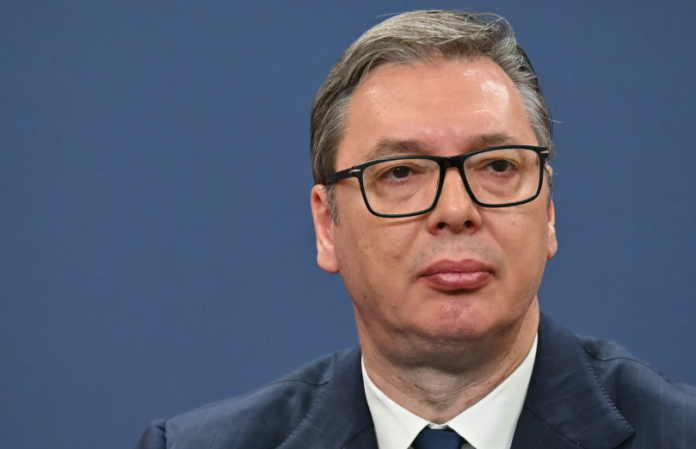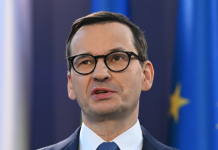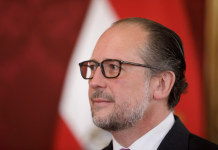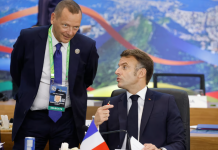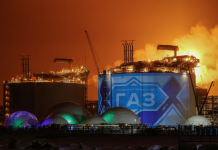BELGRADE — Serbia is facing a two-pronged squeeze on its energy supplies, with U.S. sanctions targeting its main gas and oil company over Russian ownership and Azerbaijan claiming to not be able to deliver on its supply — at the exact same time.
“These are the most severe sanctions ever affecting a company in Serbia,” Serbian President Aleksandar Vučić told a press conference on Friday. The U.S. sanctions, announced Friday, include restrictions on Serbia’s Naftna Industrija Srbije (NIS), which is majority-owned by Russia’s Gazprom and Gazprom Neft.
“They are asking us for a complete exit of Russian interests,” he said. “They do not even allow the possibility of a 49 percent stake, but demand a complete exit from NIS.”
Serbia has faced long-standing criticism for allowing Gazprom Neft to hold a 50 percent stake and Gazprom an additional 6.15 percent in its national gas and oil provider. The Serbian government owns only 29.8 percent of the company.
But both the U.S. and the EU had hesitated to act, wary of straining relations with Belgrade.
On Friday, however, the U.S. Treasury unveiled new financial sanctions targeting Russia’s energy sector and stating that the gas and oil industry of Serbia was at risk of facing secondary sanctions if the country continues to conduct transactions with Russia.
That was Friday. On Saturday, another dramatic press conference was abruptly called, during which Vučić announced that Azerbaijan would also be cutting off its supplies.
“I got information from our Azerbaijani brothers and friends that because of a force majeure and problems they have, we as of today cannot count on the 1.7 million cubic meters of gas that was coming into our country every day,” Vučić told reporters.
Azerbaijan has been serving as an alternate source of gas for a big part of southeastern Europe as well as Italy through the Trans Adriatic Pipeline, which subsequently may be distributed to other European countries not part of the Southern Gas Corridor.
The two developments are viewed as a direct challenge to the delicate geopolitical balance that Serbia’s Vučić has spent more than a decade crafting, whereby he has signaled approval of Western values and EU policies while also maintaining strong ties with Russia and China.
“We love Moscow and Washington, and everyone in the world, but Serbia is our dearest and most beloved,” Vučić said. “We will protect Serbia’s interests at all costs. There will be no shortages and there will be no catastrophe,” he said.
He stressed that the U.S. sanctions threat is not aimed specifically at Serbia but rather a push by the outgoing Biden administration to mount “a comprehensive attack on Russia, not just oil and gas production, but all related companies.”
Serbia has until March 12 to complete its final financial dealings with Gazprom and Gazprom Neft and change the ownership structure of NIS, which could see Hungary’s MOL jump in to buy the Russian stake. Vučić has announced he will speak to Russian President Vladimir Putin directly to iron out the issue.
Meanwhile, Vučić is grappling with a domestic crisis, including weeks of nationwide protests — some of the largest in Serbia’s history — sparked by a construction failure at the Novi Sad train and bus station that left 15 dead and many others injured.
“This comes at an extremely inopportune moment for Vučić, when he’s being hit from all sides on the domestic front due to the student protests,” said Vuk Vuksanović, an expert on non-Western influence in the Balkans and senior researcher at the Belgrade Center for Security Policy. “Having a gas supply issue crop up in the middle of the heating season will inevitably lead to price increases.”
Ultimately, the U.S. sanctions could dismantle one of the key pillars of the Kremlin’s influence in Serbia, known for its friendly ties and strong public support for Russia.
Yet the question on everyone’s mind is why Baku decided to deliver a blow at the same time, despite the friendly ties between Azerbaijan’s President Ilham Aliyev and Vučić.
Serbia has even honored the Aliyev family by erecting a statue dedicated to Heydar Aliyev, Ilham’s father, prominently placed in Belgrade’s most popular park. Serbia has regularly exported weapons to Azerbaijan, with an estimated annual value exceeding $50 million.
Some speculate that this could be an attempt by Moscow to exercise pressure on Serbia via Azerbaijan. While Baku has officially denied transporting Russian gas via the Southern Gas Corridor, it is widely believed to act as a rerouting channel, helping Moscow evade sanctions.
“The relationship between Moscow and Baku is extremely opportunistic but also subject to oscillations,” said Vuksanović. “Whether or not Azerbaijan is allowing themselves to be used by Moscow to apply pressure on Serbia can not be said with certainty, but the timing of the Azerbaijani ban is certainly awkward.”

